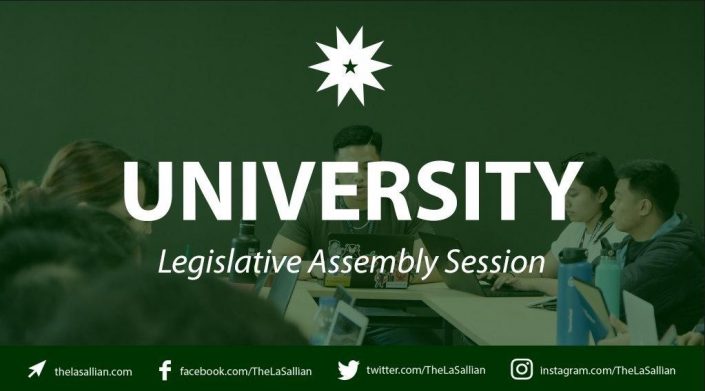In their third online session amid the COVID-19 pandemic, the Legislative Assembly met last August 8 to review and discuss the release of a statement supporting the call of medical frontliners to shift Mega Manila back to a Modified Enhanced Community Quarantine (MECQ); the approval of a manual for student representatives recruited by the Student Discipline Formation Office (SDFO); and a new provision in the USG Constitution that grants students the ability to recall a University Student Government (USG) officer from their position.
Siding with frontliners
Last August 2, frontliners and other members of the medical community pleaded for a “timeout” amid the continuing surge of COVID-19 cases, and urged President Rodrigo Duterte to enforce stricter quarantine provisions in Mega Manila. FOCUS2018 Batch Representative Renee Formoso, one of the proponents of the resolution, moved to back the petition through a statement to be released by the USG. The statement, she read, pushes for “an appeal to change the measures taken during the pandemic by the people in position,” echoing the health workers’ appeals.
Following the Assembly’s review of the statement, along with several revisions, Formoso noted that the statement is yet to be checked by the Office of Student Leadership, Involvement, Formation, and Empowerment (SLIFE) and the Committee on National Issues and Concerns (CoNIC). The resolution was subsequently laid on the table and set aside for the next session.
Recall process ‘prone to abuse’
Heated debate engulfed the session following LA Representatives’ criticism on the proposed “recall process” for the USG—a provision that would give the student body the ability to remove an incumbent elected officer “when they have lost confidence” in their representatives, described BLAZE2022 Batch Representative Giorgina Escoto.
“Any elected officer from any unit of the USG can be recalled from office provided that the petitioners for recall reach the required percentage of 50 percent plus one,” explained Escoto. Additionally, DLSU Commission on Elections (Comelec) Chairperson John Christian Ababan, who was part of the session, highlighted that the recall process can only take place at the incumbent officers’ second term—a rule inspired by the 1987 Constitution, which barred elected provincial, city, municipal, or barangay officials from being recalled during their first and last term.
CATCH2T21 Batch Representative Jaime Pastor, among other Assembly representatives, pointed out that the proposed recall process seemed very similar to an impeachment trial. Ababan clarified, however, that an impeachment trial is warranted by offenses in the 2009 USG Constitution, such as gross negligence, and violation of the USG Constitution or its bylaws.
A recall process, on the other hand, will only take place when the constituents do not find their representative to be effective in carrying out their duties, regardless of whether they have committed any violation.
For some legislators, Ababan’s justification was insufficient. FAST2018 Batch Representative Maegan Ragudo argued that the new rule was “redundant”, citing Article 20, Section 4.1 of the USG Constitution, which allows the Judiciary Department to order investigations of impeachment or recall “under their own discretion or on the basis of written complaints from any student or office of the USG”.
72nd ENG Batch Representative Ethan Rupisan even raised, ”Since the officer is already an elected, wouldn’t it be right to say [the case] is already under the Judiciary?” Ababan countered that since the constituents of the concerned elected want to have “another take at choosing a representative”, no hearing or intervention from the Judiciary would happen, only a recall election. The Comelec Chairperson furthered, “Since it’s going to be a recall election, ‘yung responsibility for implementing the recall guidelines would go to Comelec primarily.”
However, Laguna Campus Student Government Representative Michele Gelvoleo said that due to its similarities with an impeachment trial, consultation with the Judiciary is recommended.
The provision may even be “prone to abuse”, asserted Gelvoleo, stating that students can just decide to recall an officer with no basis. Escoto clarified that control measures are in place as “Comelec will be handling it and would be verifying the petition along with the petitioners.”
With representatives failing to come to a mutual agreement,along with the proponents’ failure to inform the Judiciary on the recall provisions, Chief Legislator Willem De Castro decided to have the resolution laid on the table for the time being. He also asked the resolution’s proponents to review and revise the guidelines with “stronger provisions on what exactly the parameters [are] for [determining] an underperforming elected”.
Adjusting to the times
The LA also tackled—and approved—a resolution regarding the SDFO’s Student Representatives Pool (SRP) manual. “The purpose of this resolution is to partner up and help the SDFO in recruiting [their] new set of student representatives,” shared EXCEL2020 Batch Representative Brendan Miranda, who hoped that the manual will clearly define the representatives’ duties to act “judiciously and fairly”.
The revised manual adds considerations with the current state of the University; as physical meetings are not feasible while quarantine measures are in effect, the application process has been shifted online, with SDFO utilizing platforms such as Google Meet and Zoom instead.

ERRATUM: August 9, 2020:
Updated the title of Giorgina Escoto from BLAZE2020 Batch Representative to BLAZE2022 Batch Representative.
